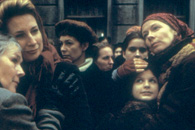

|
| home | movie reviews | features | sov horror | about | forum |
Rosenstrasse B-
Year Released: 2003 (USA: 2004)
During the screening of Rosenstrasse, I thought a lot about the girl in the red coat from Schindler's List -- the one who scampers through the Jewish ghetto as the Nazis are conducting their unimaginable purge. Would it have been possible to save her? Could she have been passed as a Gentile and smuggled out of Europe? If her mother were safe and undetected, would she surrender in order to comfort her wayward chick in those last terrible days? Rosenstrasse involves a girl in just such a situation, a Berlin Jew whose mother has been dragged off to God knows where. But there's a catch. Her father was Christian -- a "proper Aryan" who abandoned his family rather than face the consequences of his interfaith marriage. The twist helps to hauntingly invoke those difficult questions, and in many ways save Rosenstrasse from its own awkward tendencies. The girl is Ruth Weinstein (Svea Lohde), and she finds a guardian angel in Lena Fischer (Katja Riemann) -- an Aryan woman whose Jewish husband has also been detained. From February 27 to March 6, 1943, Berlin Jews with Aryan spouses were rounded up and placed in the Rosenstrasse prison, there bound for the death camps. Through the extraordinary efforts of their wives, they were ultimately spared that fate in one of the Holocaust's most unusual and least-known chapters. Director Margarethe von Trotta shows great conviction in attempting to bring their story to the screen, allowing us to understand what happened without reaching simplistic conclusions. Fischer makes a fine central figure for that process. The daughter of Prussian aristocrats, she falls in love with a brilliant Jewish musician (Martin Feifel) to the joy of her bon vivant brother Arthur (Jürgen Vogel) and the horror of her traditionalist parents. Her decision to stand by him over their objections becomes a beautiful exposition of the tensions and conflicts running through Germany at the time. Her parents aren't Nazis; they simply believe their son-in-law is unworthy, a common prejudice under which deeper monstrosities lie in wait. Arthur is kind and supportive, but eventually dons a uniform himself to fight alongside the Nazis (transforming into an ashen-faced ghost at the Battle of Stalingrad). When Lena's husband disappears, a few officials menacingly suggest that she get a divorce, but even they are seen as puppets in the system. All of them defy easy titles of heroes and villains, their complexities shading the moral implications of their actions. They also serve to illustrate the complicity the Nazis fostered, and the bankrupt ideology that it served. The essence of what Hitler hated so much -- the distinction between "good" Aryan and "evil" Jew -- is revealed here as arbitrary and hollow. Someone wears a yellow star and they're sent to Auschwitz. Someone else removes hers and walks away free. It's an empty delineation, determined by names, birth records, and pointless bits of minutia. Rosenstrasse strikes its strongest chords in demonstrating how that system could confuse and frighten ordinary people into obedience... and how some of those people could find a way to fight back. On the streets in front of Rosenstrasse, we see Aryan wives gathering in vain hope of freeing their spouses. Here, Fischer finds the abandoned Ruth, and through her begins to understand the web they have both been caught in. Her realization forms the beginnings of an extraordinary -- if brief -- social upheaval that ends with the SS pointing machine guns at the very "pure-blooded" Germans they were supposed to protect. Rosenstrasse might have soared had it stuck unwaveringly to the topic. Unfortunately, it insists on adding an intrusive framing device in the form of Ruth's modern-day daughter (Maria Schrader), who tracks down Fischer to learn the truth of her mother's past. The principle narrative is rendered in flashback, leading to periodic jolts of 21st-century reminiscences that play like warmed-over extracts from The Joy Luck Club. It serves only to interrupt the film's ostensible purpose, and struggles to bridge past events with our own present. So too does Rosenstrasse turn too quickly to melodrama, as events hinge on implausible developments that sit poorly with von Trotta's carefully constructed tone. Steven Spielberg and Roman Polanski used coincidence to devastating effect, but in their films it played as eminently plausible. Here, it becomes a screenwriters' convenience, neither astonishing enough to move us, nor reasonable enough to suspend our disbelief. And yet, Rosenstrasse endures by continually returning us to those sharp and troubling questions. If it were you on the streets of Berlin, could you stand up against what was happening, or would you shrug and say it's none of your concern? If your loved one was on the train, would you put on that star and join him, or would you turn away and save your own skin? Rosenstrasse never wavers from looking those issues in the eye, as much as its weaker elements try to detract from it. In so doing, it imbues its characters with thoughtful grace, and shines a light on a forgotten but very important moment in a dark and terrible time. Review published 09.05.2004.
|

|
| home | movie reviews | features | sov horror | about | forum |
| This site was previously at flipsidemovies.com from 2000 to 2008. |
|
contact | copyright | privacy | links | sitemap
Flipside Movie Emporium (FlipsideArchive.com)
|